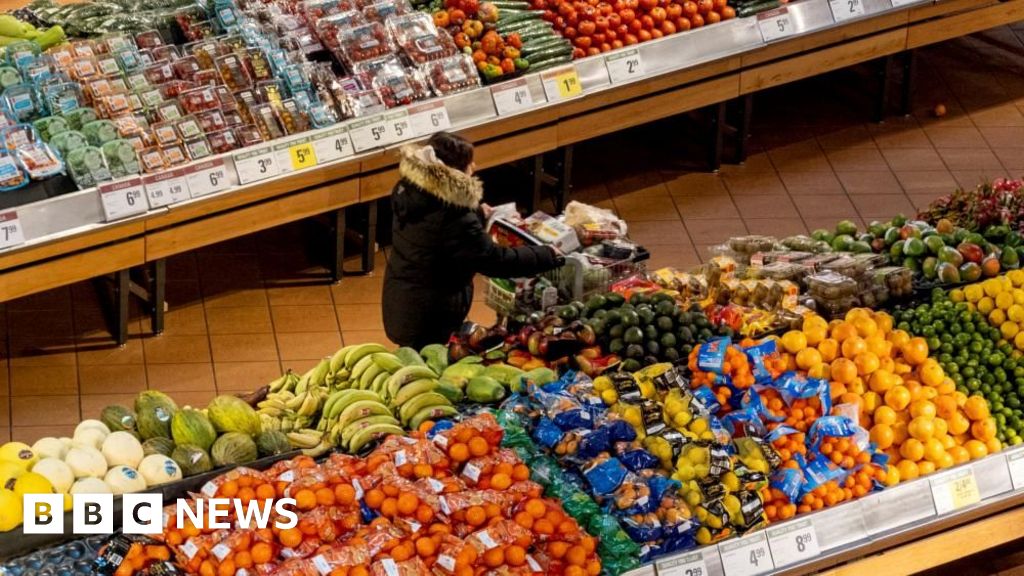Five things that are more expensive in Canada due to tariffs

Nadine Yousif
BBC News, Toronto

 Reuters
Reuters
The trade war between the US and Canada has escalated sharply with President Donald Trump increasing the tariff rate on Canadian imports from 25% to 35%.
Most goods will avoid the increased costs entering the US market because they are currently exempted under an existing North American trade treaty. But some key products are being hit hard.
Earlier this year Canada responded with counter-tariffs of its own on tens of billions of dollars worth of American products, ranging from tomato ketchup to washing machines.
While it’s too early to determine the full impact, experts say prices are already creeping up on everyday items for Canadians and will continue to rise.
Here is a breakdown of the products that have become more expensive.
Fridges and washing machines
Canada has imposed counter-tariffs on US-made washers, dryers, refrigerators and HVAC units.
This, coupled with the rise of American sheet-steel prices due to Trump’s 50% tariffs on imported metals, means the sticker price for these items has gone up, said Andreas Schotter, a professor of international business at Western University in Ontario.
For Canadians, this has resulted in the cost of refrigerators and freezers rising by 2% on average. Dishwashing and laundry appliances went up 4.5% in June from the same time last year, according to Statistics Canada.
Andrew Barclay, an analyst with the stats agency, said the percentages are offset by the fact that not all appliances sold in Canada originate from the US.
That means consumers can shop around to avoid paying more.
Prof Schotter said some retailers have been advertising “pre-tariff” sales on dishwashers and heat pumps – “an old hint that ordinary pricing is set to move up”.
New and used cars
The automotive sector has been especially hard hit by US tariffs, due to how intertwined car manufacturing supply chains are between the two countries.
A vehicle can cross the US-Canada-Mexico border up to eight times before it is fully assembled.
The Trump administration has imposed a 25% tariff on all cars and trucks not built in the US. Canada has countered with similar reciprocal tariffs, though it made exemptions for automakers that are compliant with an existing North American free trade agreement and those who continue manufacturing in the country.
Car manufacturers have also been hit by US metals tariffs.
That has resulted in higher prices on new vehicles. The cost went up more than 5% in June compared to last year, Mr Barclay said.
“We’ve also seen prices accelerate on the used car side of things, which suggests to us that folks are maybe being priced out of buying new cars,” he told the BBC.
Prof Schotter said people are choosing to keep their cars longer to avoid buying new, adding it is “the prudent thing to do”.
Peanut butter, canned soup and other groceries
Canada’s counter-tariffs are targeting a variety of US produced or manufactured foods.
Some of those items have since been subject to a temporary six-month exemption starting in April to provide “immediate relief” for Canadian businesses that rely on US products.
Still, grocery shelves are seeing an impact. Canada’s largest grocer, Loblaw, has even begun labelling items that with a “T” that have risen in price due to tariffs.
The grocer has added the label to nearly 7,500 items.
Those include tomato ketchup and other tomato sauces imported from the US, and pantry staples like peanut butter and jam.
Turkey, pasta and oranges, all of which have been counter-tariffed, have increased in cost.
Michael von Massow, a professor of agriculture at Guelph University, said fruit juice prices have risen 7.5% from last year due to counter measures on American citrus.
Canned soups saw an 8% increase in the same period due steel and aluminium levies, said Prof von Massow. Canada gets most of its food packaging – like soup cans – from the US.
The Loblaw CEO has said items labelled with a ‘T’ have seen a 20% decline in sales on average.
Clothing and footwear
June saw an unusual price hike on clothing, said Mr Barclay of Statistics Canada.
While Canada has placed counter-tariffs on US clothing imports, he believes the higher prices are not directly related to those levies but are instead a symptom of the broader ongoing global trade war.
Major manufacturing hubs like China and Vietnam have been subject to steep American tariffs, which has fuelled uncertainty for those sectors.
The result is a 2% jump in the price of clothing and footwear from last year, Mr Barclay said. It is a modest bump, he noted, but unusual because prices have been on a general decline for the last 20 years.
“A lot of it has to do with the emergence of Southeast Asian and Asian clothing hubs, which has put downward pressure on prices,” he said.
Housing and remodelling costs
Canada’s home building sector is worried the price of materials it relies on will go up.
Cheryl Shindruk, an executive at a residential developing company in southern Ontario, recently told the Canadian Press that it is difficult so far to pinpoint to what extent costs might rise.
But the uncertainty has already delayed project deadlines as her company pivots to sourcing materials locally or elsewhere.
She said some materials, like layered glass windows, cannot be replicated in Canada or non-US markets, giving her and others no choice but to pay the higher prices.
Canada has also targeted carpets, flooring and shingles with counter measures. Mr Barclay told the BBC that there has been a slight increase in the cost of homeowners’ maintenance and repairs as a result.
The prices of plumbing, utilities and structural steel framing have all increased, according to Statistics Canada data.
The Canada Mortgage Housing Corporation (CMHC) had predicted earlier this year that an ongoing US-Canada trade war would slow the economy and limit housing activity, include buying, selling and construction.
Provinces that have been harder hit by tariffs, like Ontario – in part due to its significant auto manufacturing sector – are already seeing a slowdown in housing starts by eight to 26%, according to CMHC data.













